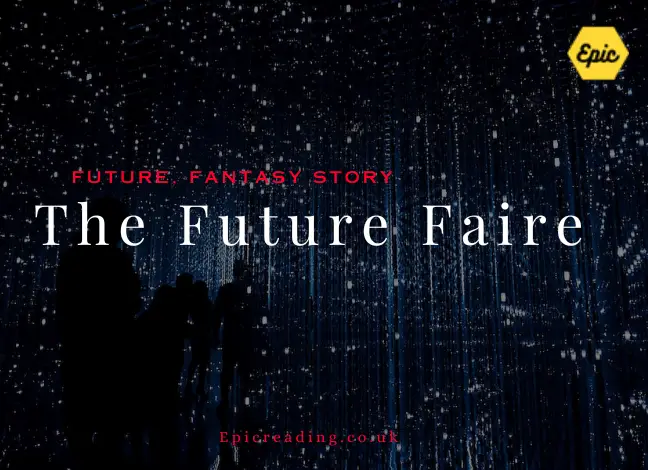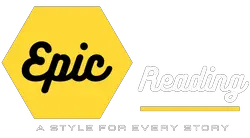
The sign comes first. It hovers high in the sky projecting green neon light, and we believe it because we don’t have such technology.
The site of the very first future housing fair. Mysterious builders spend several summer weeks carving a circular clearing into the dense forest on the outskirts of Portland. On opening day, we stand in an unmoving line with thousands of strangers, the modest admission price firmly in hand. I wonder why future men need cash, but my father says, “Business is business, no matter where you’re from.”
Mom and I laugh at that. Finally, the chill of the early morning subsides, and the sun rises over the distant cedars. My father shifts his weight back and forth a few times and I wait for his outburst. He taps the back of his hand on his palm. “If only we had been rich, we could have bought him the Cochlear 2” Through the labeled glasses, I see my mother staring at my father. He looks at me like he’s told me a secret he didn’t want me to know. I know what a Cochlear Model 2 is. A hearing aid for the wealthy. And I know what my screen glasses are. A hearing for the poor. A bright light interrupts our tension. Some noise causes the people around me to put their hands over their ears. I blink, and all at once a transparent dome appears in the clearing.
People have traveled back in time. eThose in line cheer and my glasses are littered with speech bubbles full of exclamation points and clapping graphic hands. A dozen large tents are strategically placed across the landscape, which is full of carnies offering games of skill of the future men.
I look down. The ground is dry earth, brown and cracked, trampled apartment by workers’ feet.
“Tyler?” My name floats above my glasses in a bubble with an arrow pointing to my mother. I look up. “Meet me back here in an hour, okay?”
I nod vigorously. She hands me a brochure with a map of the fair and I read the words written in capital letters on the front. NO TECHNOLOGY IS TO LEAVE THE FAIREGROUNDS!
“I’m going to the Future Vid Games.” I recite, and the mini-speakers on my glasses verbalize my lie to my parents. They always believe me, because my electronic voice has been programmed to be emotionless, and my eyes are blurred behind a hazy display. On the map, I draw the way to the Medical Pavilion with my finger.
The future men mass
The sign comes first. It hovers high in the sky projecting green neon light, and we believe it because we don’t have such technology.
Mysterious builders have spent several summer weeks carving a circular clearing into the dense forest on the outskirts of Portland. On opening day, we stand with thousands of strangers in an unmoving line, the modest admission price firmly in hand. I wonder why people from the future of nhs need cash, but my dad says, “Business is business, no matter where you’re from.”
Mom and I laugh at that. Finally, the early morning chill subsides, and the sun rises over the distant cedars. My dad shifts his weight back and forth a few times and I wait for his outburst. He taps the back of his hand on his palm. “If only we had been rich, we could have bought him the Cochlear 2” Through the labeled glasses, I see my mother staring at my father. He looks at me as if he has told me a secret he didn’t want me to know. I know what a Cochlear Model 2 is. A hearing aid for the wealthy. And I know what my screen glasses are. A hearing aid for the poor. A bright light interrupts our tension. A noise causes the people around me to put their hands over their ears. I blink, and all at once a transparent dome appears in the clearing.
People have traveled back in time. Those in line cheer, and my glasses are littered with speech bubbles full of exclamation points and clapping graphic hands. A dozen large tents are strategically placed in the landscape, which is full of carnies offering games of skill from the future.
I look down. The ground is dry earth, brown and cracked, the apartment trampled by workers’ feet. “Tyler?” My name floats above my glasses in a bubble with an arrow pointing to my mother. I look up. “Meet me back here in an hour, okay?”
I nod vigorously. She handed me a brochure with a map of the fair and I read the words written in capital letters on the front. NO TECHNOLOGY IS TO LEAVE THE FAIREGROUNDS!
“I’m going to the Future Vid Games” I say, and the mini speakers on my glasses verbalize my lie to my parents. They always believe me, because my electronic voice has been programmed to be emotionless, and my eyes blur behind a blurry display. On the map, I draw the way to the Medical Pavilion with my finger.
I shake my head. “No more,” he says, aghast. I reach out to shake his hand, but he bumps his back against the Beatific display case. It falls over and shatters into countless shards of glass. The sound reaches my ears and I flinch. My mother appears. How could she have known? She pulls my hands from my ears and examines them. “Are you hurt?”
Her voice is soft, softer than the doctors, and not as rough as my surroundings, which have mercifully gone quiet.
“No.” I try to speak, but the word comes out as a cough. My mother straightens up and stares down at me. She turns around, looks at the broken display, and then turns back. “What was in that suitcase?” The tone of her words is angry. Or maybe I just read her stiff posture and tense muscles, as usual.
My mother shakes her hands as if drying them after washing them, but I recognize her method of relaxing. “I had a feeling you’d come here.” She hugs me and I feel safe. Protected. The noise in the room grows louder again. Several authoritative-looking men emerge. “Is that him?” one asks. He looks mean and edgy. His pale gray business suit seems to stick to his body as if it were his skin and not his clothes.
The concerned-looking doctor casts a shadow over her. “Yeah, I had no idea the kid was deaf. How many children are deaf?”
I read and hear the words at the same time, and I feel giddy with happiness. One day, when the spoken words make sense, I won’t need my glasses.
“These people are from the past, doctors. Many of them were deaf or blind or had some kind of disease.”
“You can fix that, can’t you? Make him deaf again?” the doctor asks.
I look at him in horror. My mother and I both say, “No.”
The man leans in close to me, his eyes narrowing with curiosity. Even though I’m in my mother’s arms, his gaze freezes me. “No technology is allowed to leave the fairgrounds,” he says
“Stay away from my son,” my mother says.
“Ma’am.” He straightens up. “At the fair, it’s called: Look, but don’t touch. That’s the law.” He growls a little after he finishes speaking.
I don’t like the sound of his voice. I crawl deeper into my mother’s arms.
“He has no technique,” my father says from nearby. He pushes aside a bystander, and I feel even safer now that he’s there. “I’m afraid he does, sir. We’ll have to… he’s got to come with us. “I hear a steady sound in the distance, pleasant and encouraging. “Is that music?” I ask. The melody releases some of the tension in my body and I feel somehow connected to it. Or she’s connected to me.
The common man snorts. A headline appears with an ellipsis. Impatience? Annoyance? Finally, he replies, “It’s just a generic fairground tune from the public domain.” I concentrate as best I can on the distant music. My body wants to move with it. I want to dance.
“We’re going.” My mother grabs my arm, and we walk behind my father. The music gives way to more urgent sounds. I try to concentrate, to hold on, but I don’t know how.
The number of people in the room has thinned. Guards block the two exits. What kind of future men weapons might they carry? Lasers that can wipe out entire mountains. Machines that flatten the earth, as they did on this former mountainside.
The man stretches out his arms as if carrying me — somewhere. “Please understand, ma’am. If he leaves, there could be a paradox. Your son could get us all killed.”
My father faces the man. His posture shows he’s ready to fight. “Didn’t you think of that before you came?”
The man’s hardened expression softens, and he looks regretful. “We thought if no physical technology…”
“Wait,” I interrupt. “I’ll go.”
“No.” My mother crouches down and grabs my arms. “We’re taking you home.”
I don’t know why I’m suddenly so brave, but hearing this makes me feel invincible. Do all people feel like this all the time?
“I know what a paradox is, Mom. When I step out of the fair, we all disappear from life.” I snap my fingers and hear the sound. I’ll remember it, and all the other sounds I collect. My mother’s voice. My father’s voice. They can’t erase my memories.
“What are the risks?” my father asks. He doesn’t seem convinced that they should take me, but I think he’s starting to understand — I screwed up.
The mean man turns to the doctor hovering over his right shoulder and says, “Well, we don’t have the technology to take away someone’s hearing. I… I’m going to have to improvise.”
“You’re not taking him,” my mother says.
I turn and look her in the eye for a change instead of staring at the words on my glasses. “say something nice. I just want to remember.”
My mother has tears in her eyes, and she speaks very slowly. “I love you, Tyler.”
I smile through the pain in my chest. I’ll be strong — for her. My mother holds me tight until strong hands grab my shoulders and pull me away. In an isolated, well-lit room, they place me on a padded couch. A sea of device-like pens lies on a metal tray to my left.
My parents loiter outside. They’re not allowed inside.
“I’m sorry about that, kid. I really am.” The mean man shakes his head in resignation. “I thought we had provided for every possibility.” He pulls back and the doctor who gave me the ear grabs one of the pens. He looks at it uncertainly and then leans over me to dim the overhead light. “I’ll try to heal you again. Maybe a second cure will overload your ear canals.” He shrugs, and there’s nothing scarier than a doctor shrugging his shoulders.
I close my eyes and hum the tune I heard earlier. I’d like to think it’s a song played at weddings. A big, rousing song about love, passion, and joy.





